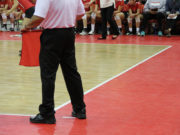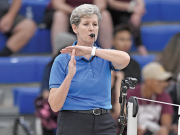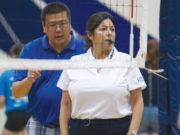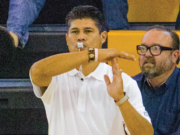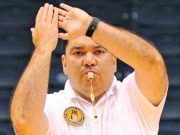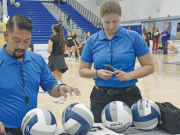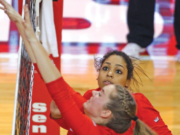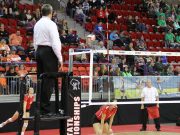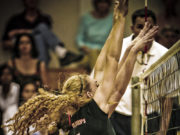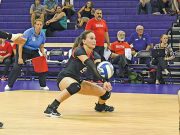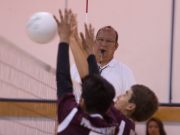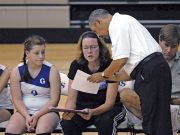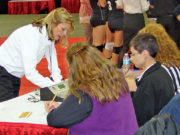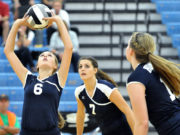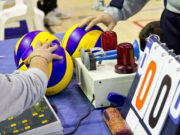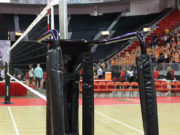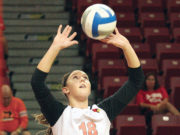Volleyball
Outside the Lines
Defining the playing area is an important part of the referees’ prematch duties. Identifying obstacles, any changes in court surface or elevation, and establishing...
No Time Off
Officials often wonder what higher-level officials are thinking between points while up on the referee stand.
What is going through the minds of officials as...
Still Work to Be Done When There’s a Break in Play
The referees accept the coach’s or captain’s request for timeout and blow the whistle, starting the timeout procedure. Both teams usually move to the benches for a quick...
Train Your Brain
Do you ever wonder if you have the correct type of brain for officiating? Do you find it easy to make a quick decision based...
Veteran Approach
As we prepare for each season, we study rules and interpretations, casebooks and officiating manuals, and attend preseason clinics and meetings. And once the season starts, we usually have...
Second Referees Need Training Too
Very early in my officiating career, I received a call to officiate a local collegiate match. My partner was someone I had not worked with previously. While I thought...
How to Tackle Pre-Match Responsibilities as a Team
It is important to arrive at a match with plenty of time to prepare yourself mentally as well as making sure to have enough time to conduct pre-match...
Don’t Lose Focus
Some inexperienced second referees lose focus at times and turn their attention away from the net too soon to watch that great defensive play in the back row. As...
The Changing Role of Volleyball’s Second Referee
To the casual fan, the role of the second referee can appear to be minor: check lineups, call nets and manage timeouts and substitutions....
Did You Hear What I Didn’t Say?
As most volleyball officials would agree, non-verbal communication encompasses approximately 80-90 percent of our communication with coaches, players, partners and fans. There are so...
No Tunnel Vision With Wide-Angle View
What problem is most common among second referees? Some might say coaches chewing them out about questionable decisions or missed calls by the crew....
Aim High By Working Lower Levels
Once we obtain an officiating certification, it seems that many of us want to jump in and start working the highest levels of play...
Take Your Line Judge Game to the Next Level
Line judging, at any level, has its challenges. The game can move quickly and there are so many things to watch and think about...
Collective Blocks Cut & Dried?
Collective blocks, at face value, seem pretty cut and dried — multiple players in close proximity at the net, reaching higher than the top...
Situational Awareness Suits Volleyball Officials
Have you ever looked back on a tough situation in a match, one that maybe you wish you had handled better, and said to...
Set the Table
For years, we’ve never really acknowledged the importance of the scorer as an integral part of a volleyball officiating crew. It seems there has...
Hold It! Who Handles Ballhandling?
A primary responsibility of the first referee is to determine whether a player makes legal contact each time he or she plays the ball....
Double Check Score After Unusual Situation
Communication between the referees and the scoring crew is crucial to ensure accuracy of the score and the information recorded on the scoresheet. Double...
Post-Match Pitfalls
We just want to be understood. It’s human nature, especially when it comes to officiating — we want people to know, understand and accept why we made a...
Movement and Coverage Tips for the Second Referee
Volleyball referees don’t move a lot during play, compared to referees in other sports. But there are a lot of challenges involved in calling...
Get A Grip
I
t’s tough to get officials on the same page when determining the three toughest calls in volleyball. There are many strong feelings and opinions...
Don’t Compound Missed Calls
We have all made mistakes, there are plenty of reasons why, but officials can't compound missed calls with phantom calls.
It can happen with ballhandling....
Spirit and Intent Influence Interpretation
When considering the rules, spirit and intent influence interpretation. It would be easier if every rule was black and white. No wiggle room. We...
5 Rule Differences Every Referee Must Know
Many volleyball referees work multiple sports. While it is difficult to keep all the rules straight from sport to sport, it is unlikely a...

